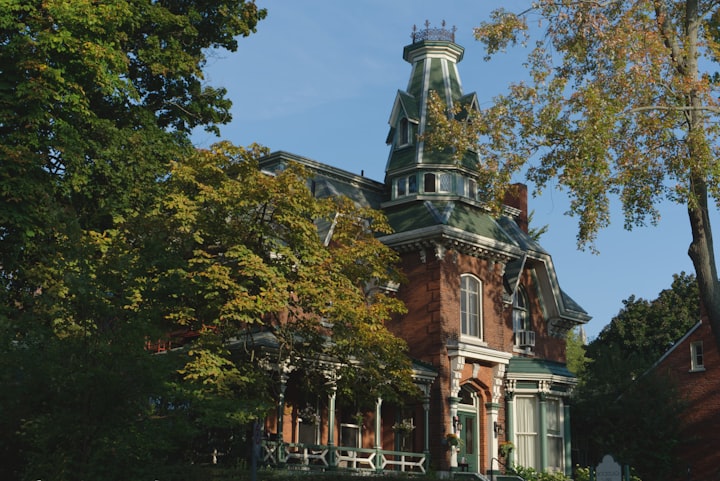Lizzie and the Bull
A Story of Loss and Moving Forward

When Grandma left for the stars, her children journeyed back to the island to help strip their childhood home to its bones. While they all stepped from ferry to dock, my mother and I had the luxury of a brief stroll. I had long memorized the imagined trail from our house to Grandma’s, and I’d learned to watch for the home’s Victorian trim growing over the hill as we neared its peak. That day however, my mother refused to let me stop for stones or eye-catching fungi. There would be no window sills for Grandma to display them; no stews for Grandma to add them to.
The six brothers, old and young, emptied the rooms of their furniture, antique bed frames moaning in protest, squeezed through door frames at odd angles, snug like important envelopes through a mailslot. The four sisters had stationed throughout the house, packing with haste, garbage bags bulging with clothes they’d given up folding, boxes overflowed with bubble-wrapped porcelain. I wandered through the home like a spirit, drifting from room to room without purpose, my uncles refusing the help of my “toothpick arms”, my aunts shooing me once I’d let a third knick knack shatter, fallen to floor through the slip of my fingers.
Anything in the home worth claiming had already been claimed; my aunts and uncles had slowly walked through the rooms that morning, pressing sticky notes marked with names to the trinkets and heirlooms, claiming what they wished. My mother had used only one note, peeling it from pad like skin from a clementine, sticking it to the edge of a small barn‒ a nativity scene my grandma displayed year round, void of the ceramic infant she revealed each Christmas Eve. We’d all come to love the theatrics of my grandma’s rendition of “Silent Night” as she gingerly placed the baby in its manger.
My mother rolled the shepherds and angels in newspaper, and I watched quietly, hands folded to lap. She paused, handing me the tiny bull “for safekeeping”, its horns chipped to nubs, the bull’s once painted eyes faded and expressionless. “He was always your favourite. You’d make him walk around and moo”. I stuffed him in my pocket and searched for the baby in cushions and ring boxes, to no avail. My aunts, amidst their packing, also helped my mother search for the missing figurine in every drawer, bag, and pocket.
“We looked through everything, Nicole,” my aunt Sue said, wiping her brow to the inside of her shirt. The sisters had regrouped in the family room, each of their piles towered over my mother’s barn, sticky note lamps, hat boxes, and handbags filling the room with an unsettling emphasis of its emptiness.
“I know.” My mother’s eyes welled, her hands folded over my shoulders. “I’m just… frustrated. I don’t know why she always hid that damn thing. You’d think, she would have…” She swallowed the thought.
“Hey…remember that one year, you and Ken tore Mom’s room apart trying to find it?” my aunt Sandra offered, the corner of her mouth flicking into a smile. Aunt Sue groaned, playfully turning to my mother.
“That was the year you found the gifts and broke my Walkman!”
The tears had fallen, but my mother was smiling now, laughing, in dodge of her sister’s pokes.
“She made me wash dishes for months after that!” My mother’s smile softened in the nostalgia, but then her eyes relit, her lips stretched into a grin. “Oh, I just remembered why we looked for it!” She bent in laughter. “Ken said if we hid it from Mom and pretended to find it, she’d tell Santa to bring us extra gifts!”
The women’s laughter echoed through the rooms, bouncing from the yellow walls, brightness discoloured in rectangles where photos had hung. Aunt Bea took my mother’s hand, weaving their fingers together like the knit of a sweater, the childish swing of arms reminiscent of how my mother often swung mine as we climbed the hill to Grandma’s.
“Are you sure you won’t take anything else then, Nicole?” she asked my mother gently.
“I don’t think so. Lizzy will just have to craft me a new one.” My mother petted the top of my head, smoothing the hairs that flared from my ponytail. She was smiling, and her voice was pleasant, but when I looked up, her chin wobbled slightly, trembling with the threat of more tears.
The women nodded thoughtfully, pulling invisible threads and hairs from their sweaters, unsure what to say. I thought for a moment, and had a wonderful realization.
“Maybe Grandma hid it in a secret spot, like a trapdoor! I’ll look for it everyday.”
I waited for their approval. “What a clever girl,” Aunt Sue was surely about to say, while the rest of the group would nod in agreement. Instead, I was met with blank stares, Aunt Bea's lips folded inward, eyes wide, cast to floor.
“Lizzie, we talked about this,” my mother said, her voice stern. She turned me toward her and I watched the lines on her forehead deepen.
I frowned, thinking back to the conversation she was referring to. Ever since the funeral, she had been giving important talks about dying and heaven and “moving forward”. She always said that, at the end of every talk‒ “moving forward”. I was getting bored of these lectures, and no longer made an effort to conceal my sighs of displeasure. But she mistook my boredom for grief, and so everyday, she found something new to sit me down for.
“So, you understand why we’re packing Grandma’s house, right?” she had asked days prior, my feet dangled over mattress. I smoothed my hands across the bright green sheets, freshly washed. They smelled of pine and soap.
I nodded. This talk had been brief.
“Can you say it back, please?”
I sighed. Not nearly brief enough.
“Grandma doesn’t need pots and pans because they have angels cooking soup and all her favourite foods in heaven, and she doesn’t need clothes because there’s clothes in heaven, and she doesn’t need, um...her walker, because in heaven, Grandma's better.” I counted the points on my finger.
My mother blinked.
“Right. So you understand the house won’t belong to Grandma anymore?”
I nodded, picking at a hangnail on my thumb.
My mother had been patient that day. Now, her eyes were tired, her jaw clenched.
“Lizzie,” my mother said. Her cheeks were pink.
“What?”
“We talked about this,” she repeated, brushing a hair from my forehead. I cringed from her cool fingers.
“No we didn’t,” I lied.
“Yes. We did.” There it was again, that firm voice. The voice she used for bad report cards and biscuit crumbs on the sofa. Grandma never used a voice like that with me, even when she was cross.
“Nicole, we’ll go help the guys finish loading the trucks, okay?” I wasn’t sure which aunt said this, but suddenly the room was even emptier. My mother’s arms were folded, her lips curled into a thin frown.
“Lizzie, we’re not moving into Grandma’s house.”
My face scrunched, compressed into a scowl, the inside of my brows pointed toward my nose.
“I’ll live here by myself then.”
“Sweetheart, you have to give San Francisco a chance, all your cousins are there, and‒”
“I’ll live here by myself!” I yelled, running for the stairs. My shoelace looped over the nose of a decorative metallic swordfish, pulling one of my aunt’s piles to the floor in a spread of decor and kitchenware. I flinched at the shatter, leaping over the mosaic shards in my race for the staircase.
“Elizabeth Anne!”
I ignored her thunderous steps behind me, climbing, shaking like linen on a windy clothesline in thrust of my grandma’s room. I turned the lock with a quick snap.
I waited for the door to tremble with the knocks and screams of my mother, but the room was still, and cold. I stood at its center, fists balled at my sides, the ceiling fan sputtering above my head in rhythm with my mother’s heavy retreat down the steps. She was speaking to someone, but the words were muffled and indistinguishable.
I could see the carpet marks where my grandma’s bed had been just that morning. The small circular indents where the legs had rested, unmoved for decades. My grandma had spent most of her final days in that bed, as had I. Her silk sheets had been stained with paints and nail polishes and crumbs of snipped thread from our paint-by-numbers and embroidery packs she’d ordered from catalogues. In those moments and days, I craved her healthiness; the mornings in her garden, when her hands were still strong, pulling beets from the soil in a crackle of snapping roots. I missed the smells of tomato soup and yeast being baked while I played. I missed our foraging. I missed her not being in pain.
During these final weeks, we ended our evenings with VHS cartoons, the sizzle of television static luring my mother into the room and under the covers like a pet in from the rain. Eventually, she would leave for trays of apple slices with cinnamon, and three separate bowls of popcorn. Mother’s kernels were dusted in salt; mine with vinegar. Grandma’s with sugar. Mother would tuck her toes under Grandma’s legs to warm them, our shoulders pressed together in laughter at the mischief onscreen.
I wondered who had taken the television. Or the VHS. Or the tapes. I felt the bull expand in my pocket, heavy like lead.
I crumpled to the floor, fingers tracing the carpet craters. I whimpered, the whines growing and splintering into broken sobs, my throat scratched in release of a booming wail. Cheek to carpet, I wept, the heaviness of the lifeless room pressing me into the floor like a boot to mud, my back heaving with my cries, tears collecting at my nose.
“Lizzie, open up please! Come on baby, open the door.”
I hadn’t heard my mother climb the stairs. I’d learned to tune out the sounds of my grandma’s home, its frame perpetually creaking and groaning under toe. Blood hissed to my head as I stood, dizzying my trudge to the door. I turned the lock and waited for her to come in.
She must have gone outside, because she smelled like rain. Her arms had enveloped me, rubbing my back in small circles. Her fingers glided like ice skaters preparing to leap, her soft affirming coos submitting me to cry into her, quiet beyond the occasional sniffle.
“Lizzie, we’re going to figure this out. I promise.”
My mother released me from her chest, holding my shoulders at arms length. Her cheeks were speckled in lines of black mascara, stamped on a canvas of rouge. She reached into her jeans, holding something between our eyes.
“Oh.” I whispered, swallowing. “You found it.”
“Well, Grandma’s old mantle clock broke when you tripped.”
I blushed. “Is Aunt Sue Mad?”
“She thinks Uncle Dale can fix it.”
“But it was in the clock?”
“Behind the face.”
“Wow,” I exhaled, frowning at the baby.
She held my chin.
“Lizzie, we’re going to figure this out.”
I wasn’t sure this was true, in fact, it felt like a lie. But the strength in my mother’s voice filled me with a sense of calm, soothing me like a wet cloth to a fevered forehead. She handed me the baby and I rested it in my palms, running my thumb over its cheeks. I carefully pocketed it opposite the bull, and we stood in awe of the room, breathing in the stains and cracks we’d taken for granted. She folded her fingers through mine and I gently swung our hands in our descent down the stairs.
About the Creator
Mina Wiebe
Figuring things out; finding my voice. Thanks for visiting.






Comments
There are no comments for this story
Be the first to respond and start the conversation.